-
 Bitcoin
Bitcoin $105,555.6614
0.18% -
 Ethereum
Ethereum $2,536.3674
-0.57% -
 Tether USDt
Tether USDt $1.0005
0.00% -
 XRP
XRP $2.1544
-0.29% -
 BNB
BNB $649.0999
-0.39% -
 Solana
Solana $145.9223
-0.54% -
 USDC
USDC $0.9998
0.00% -
 Dogecoin
Dogecoin $0.1768
-0.58% -
 TRON
TRON $0.2719
0.43% -
 Cardano
Cardano $0.6301
-1.20% -
 Hyperliquid
Hyperliquid $40.0448
-4.99% -
 Sui
Sui $2.9955
-1.70% -
 Bitcoin Cash
Bitcoin Cash $442.7020
1.14% -
 Chainlink
Chainlink $13.2320
-0.24% -
 UNUS SED LEO
UNUS SED LEO $9.1712
1.44% -
 Avalanche
Avalanche $19.0911
-1.17% -
 Stellar
Stellar $0.2579
-0.94% -
 Toncoin
Toncoin $2.9630
-2.01% -
 Shiba Inu
Shiba Inu $0.0...01207
-0.53% -
 Litecoin
Litecoin $85.9706
-0.39% -
 Hedera
Hedera $0.1539
-2.88% -
 Polkadot
Polkadot $3.7888
-0.80% -
 Ethena USDe
Ethena USDe $1.0003
-0.03% -
 Monero
Monero $316.7214
1.57% -
 Dai
Dai $0.9999
0.01% -
 Bitget Token
Bitget Token $4.5297
-0.64% -
 Pepe
Pepe $0.0...01110
-0.70% -
 Uniswap
Uniswap $7.3274
-1.89% -
 Pi
Pi $0.6167
5.17% -
 Aave
Aave $275.7526
-3.57%
Which wallet should you choose for frequent transactions?
For frequent cryptocurrency transactions, prioritize wallets with efficient transaction processes, robust security features, convenient accessibility, competitive fees, and advanced functions like market analysis tools and automated trading.
Feb 19, 2025 at 10:00 pm
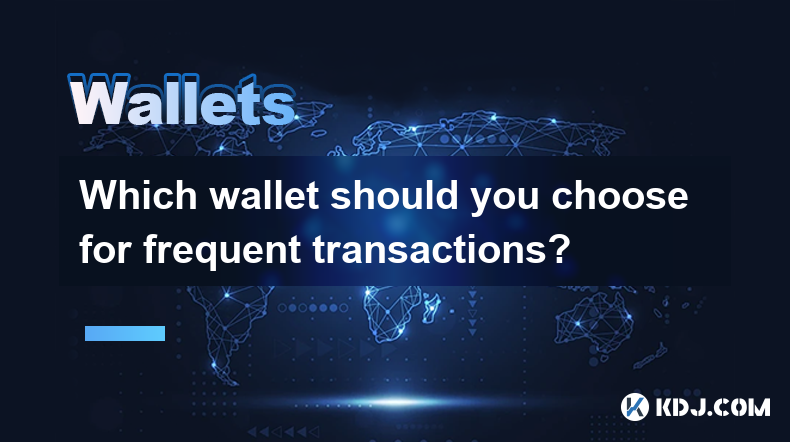
Key Points
- Understanding Your Transaction Frequency and Needs
- Evaluating Wallet Security Features
- Considering Wallet Accessibility and Compatibility
- Examining Wallet Fees and Transaction Costs
- Exploring Advanced Wallet Functions
Which Wallet Should You Choose for Frequent Transactions?
Understanding Your Transaction Frequency and Needs
Determining the frequency of your cryptocurrency transactions is crucial for wallet selection. High-frequency traders or users with multiple daily transactions require wallets that prioritize efficiency and speed. Consider wallets with streamlined transaction processes, such as hardware wallets with built-in signature verification or software wallets optimized for mobile payments.
Evaluating Wallet Security Features
Security should be paramount when selecting a wallet for frequent transactions. Opt for wallets that employ robust encryption methods, such as AES-256 or Shamir's Secret Sharing, to safeguard your private keys. Look for wallets with multi-factor authentication (MFA), biometric authentication, and tamper-protection mechanisms to prevent unauthorized access.
Considering Wallet Accessibility and Compatibility
Choose a wallet that seamlessly integrates with your devices and platforms. Consider mobile wallets for quick and convenient access, hardware wallets for secure storage and offline transactions, or desktop wallets for managing larger portfolios. Ensure your wallet is compatible with the cryptocurrencies and tokens you commonly transact in.
Examining Wallet Fees and Transaction Costs
Be aware of fees associated with wallet transactions, including network fees, exchange fees, and withdrawal fees. Choose wallets with competitive fees and consider wallets that offer flexible fee options or discounts for high-volume trades. Compare transaction costs across different wallets to optimize your expenses.
Exploring Advanced Wallet Functions
For frequent traders, advanced wallet features can enhance efficiency and profitability. Look for wallets with built-in market analysis tools, charting capabilities, and news aggregation. Consider wallets that support automated trading, staking, or integration with decentralized exchanges (DEXs) for seamless transaction execution.
Steps to Choose a Wallet for Frequent Transactions
- Analyze your transaction frequency and requirements: Determine how often you make crypto transactions and identify specific needs based on your trading patterns.
- Assess your security preferences: Prioritize wallets with advanced encryption and robust security measures to protect your funds from unauthorized access and theft.
- Evaluate wallet accessibility and compatibility: Select wallets that provide convenient access on your preferred devices and seamlessly integrate with the cryptocurrencies you trade.
- Compare wallet fees and transaction costs: Research transaction fees associated with different wallets and choose wallets that offer competitive rates and flexible fee options.
- Explore advanced wallet functions: Consider wallets with additional features such as market analysis tools, trading automation, or staking options to enhance your trading experience and profitability.
FAQs
What is the most secure wallet for frequent transactions?
The security of a wallet depends on its encryption, authentication mechanisms, and overall design. Hardware wallets generally offer the highest level of security, followed by software wallets with robust security features.
What is the best wallet for trading cryptocurrencies?
Wallets that provide advanced trading tools, market analysis capabilities, and integration with DEXs are suitable for frequent traders. Consider wallets that streamline trading processes and offer automated trading options.
Which wallet has the lowest transaction fees?
Fees vary among different wallets and may depend on the transaction volume, coin type, and wallet provider. Research wallets with flexible fee structures or those that offer discounts for high-frequency traders.
Disclaimer:info@kdj.com
The information provided is not trading advice. kdj.com does not assume any responsibility for any investments made based on the information provided in this article. Cryptocurrencies are highly volatile and it is highly recommended that you invest with caution after thorough research!
If you believe that the content used on this website infringes your copyright, please contact us immediately (info@kdj.com) and we will delete it promptly.
- PayPal Clears SEC Stablecoin Probe, Expands Crypto Access
- 2025-06-15 13:25:12
- Bitcoin (BTC) Realized Market Cap Hits All-Time High, Signalling a Bullish Rally Ahead
- 2025-06-15 13:25:12
- Qubetics Emerges as the Best Altcoin to Buy now in 2025, Outpacing XRP, Cosmos, Monero, and Polygon
- 2025-06-15 13:22:25
- New Mexico's Roswell Becomes the First US City to Adopt Bitcoin as Its Reserve Asset
- 2025-06-15 13:22:25
- Bitcoin (BTC) Price Soars Over 10% as Investors Rush to Buy the Crypto
- 2025-06-15 13:10:12
- Should You Keep Holding Kaspa Tokens Despite the Scary Price Action?
- 2025-06-15 13:10:12
Related knowledge
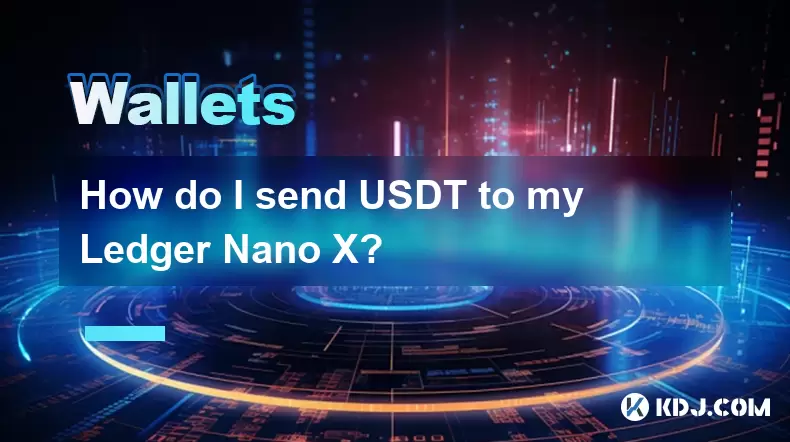
How do I send USDT to my Ledger Nano X?
Jun 15,2025 at 06:28am
What is USDT and Why Use Ledger Nano X?USDT, also known as Tether, is one of the most widely used stablecoins in the cryptocurrency ecosystem. It operates on various blockchain networks such as Ethereum (ERC-20), Tron (TRC-20), and others, offering users a digital asset pegged 1:1 to the US dollar. When it comes to storing USDT securely, hardware wallet...
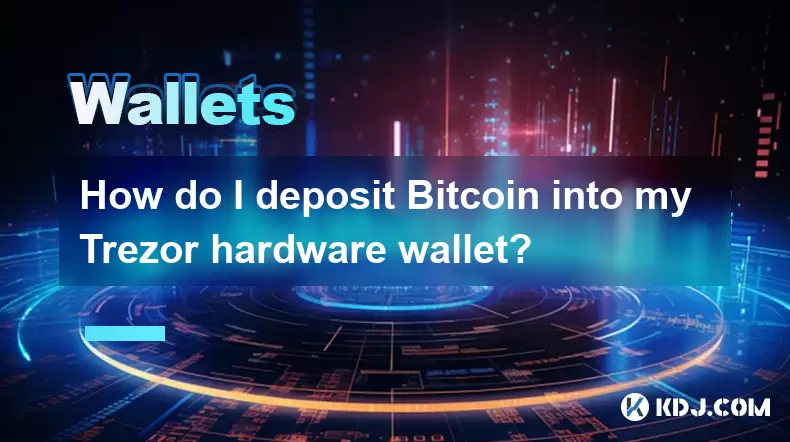
How do I deposit Bitcoin into my Trezor hardware wallet?
Jun 14,2025 at 12:29pm
What is a Trezor Hardware Wallet?A Trezor hardware wallet is a secure device designed to store cryptocurrencies offline, protecting them from online threats. Unlike software wallets, which are vulnerable to hacking and malware, Trezor stores private keys on the physical device itself. This ensures that transactions can only be approved by physically int...
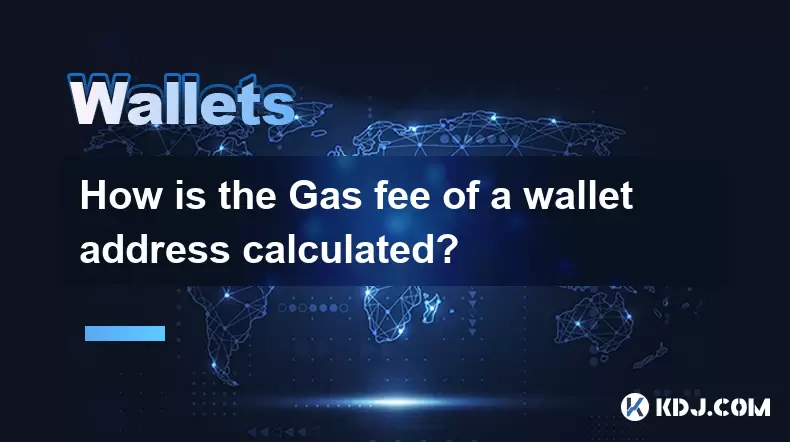
How is the Gas fee of a wallet address calculated?
Jun 14,2025 at 07:57pm
Understanding the Basics of Gas Fees in Blockchain TransactionsIn the cryptocurrency ecosystem, particularly within Ethereum-based networks, a Gas fee is an essential component of executing transactions or smart contract operations. The Gas fee serves as compensation for miners or validators who process and confirm transactions on the blockchain. It is ...
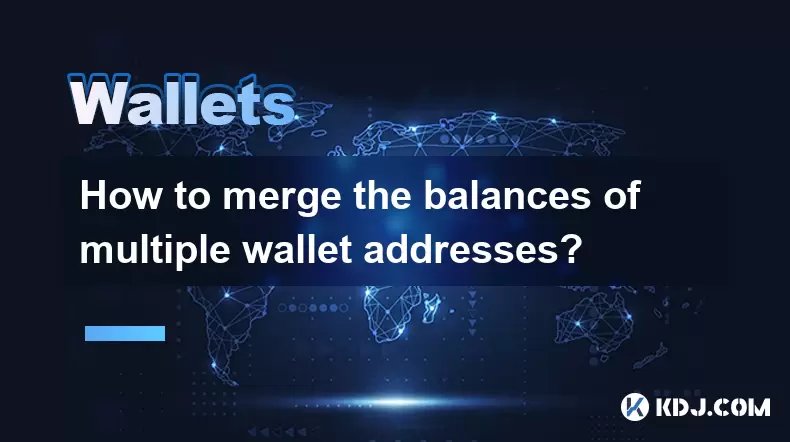
How to merge the balances of multiple wallet addresses?
Jun 13,2025 at 06:21pm
Understanding the Concept of Merging Wallet BalancesMerging the balances of multiple wallet addresses involves consolidating funds from different cryptocurrency wallets into a single address or account. This process is commonly undertaken by users who manage several wallets for security, diversification, or organizational purposes. Merging balances can ...
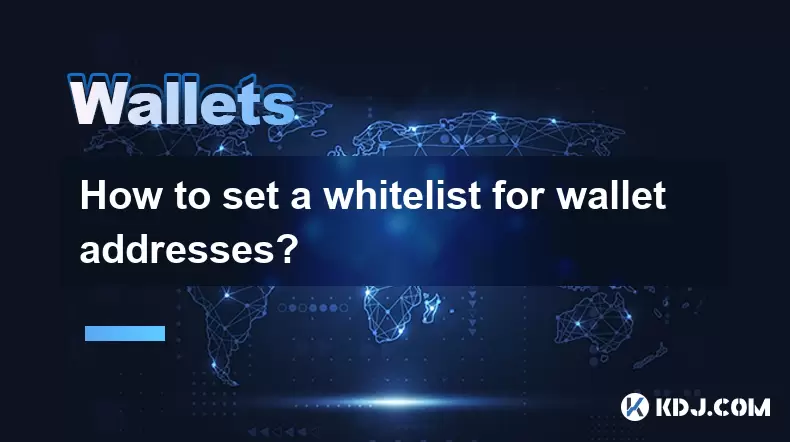
How to set a whitelist for wallet addresses?
Jun 15,2025 at 03:14am
Understanding the Concept of a Whitelist in BlockchainIn the realm of blockchain technology, a whitelist refers to a predefined list of approved entities—in this case, wallet addresses—that are granted access or permissions within a system. This mechanism is commonly used during token sales (ICOs/IDO), NFT minting events, and smart contract interactions...
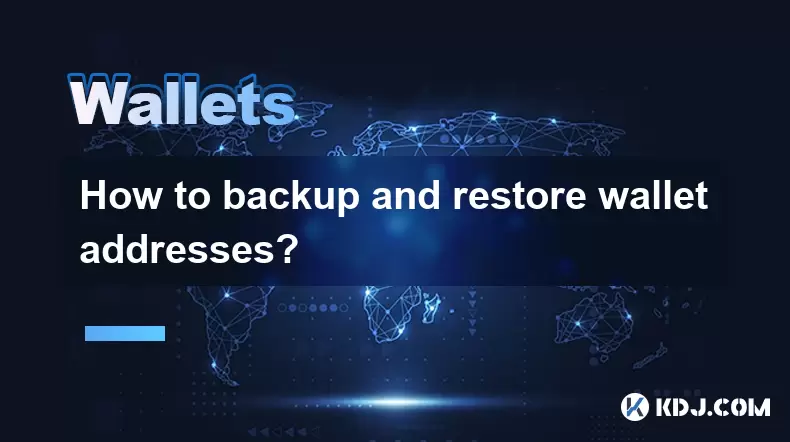
How to backup and restore wallet addresses?
Jun 14,2025 at 03:21pm
Understanding Wallet Addresses in CryptocurrencyIn the world of cryptocurrency, a wallet address is a unique identifier that allows users to send and receive digital assets. It functions similarly to an email address or bank account number. Each wallet address is associated with a private key, which grants access to the funds stored at that address. Los...

How do I send USDT to my Ledger Nano X?
Jun 15,2025 at 06:28am
What is USDT and Why Use Ledger Nano X?USDT, also known as Tether, is one of the most widely used stablecoins in the cryptocurrency ecosystem. It operates on various blockchain networks such as Ethereum (ERC-20), Tron (TRC-20), and others, offering users a digital asset pegged 1:1 to the US dollar. When it comes to storing USDT securely, hardware wallet...

How do I deposit Bitcoin into my Trezor hardware wallet?
Jun 14,2025 at 12:29pm
What is a Trezor Hardware Wallet?A Trezor hardware wallet is a secure device designed to store cryptocurrencies offline, protecting them from online threats. Unlike software wallets, which are vulnerable to hacking and malware, Trezor stores private keys on the physical device itself. This ensures that transactions can only be approved by physically int...

How is the Gas fee of a wallet address calculated?
Jun 14,2025 at 07:57pm
Understanding the Basics of Gas Fees in Blockchain TransactionsIn the cryptocurrency ecosystem, particularly within Ethereum-based networks, a Gas fee is an essential component of executing transactions or smart contract operations. The Gas fee serves as compensation for miners or validators who process and confirm transactions on the blockchain. It is ...

How to merge the balances of multiple wallet addresses?
Jun 13,2025 at 06:21pm
Understanding the Concept of Merging Wallet BalancesMerging the balances of multiple wallet addresses involves consolidating funds from different cryptocurrency wallets into a single address or account. This process is commonly undertaken by users who manage several wallets for security, diversification, or organizational purposes. Merging balances can ...

How to set a whitelist for wallet addresses?
Jun 15,2025 at 03:14am
Understanding the Concept of a Whitelist in BlockchainIn the realm of blockchain technology, a whitelist refers to a predefined list of approved entities—in this case, wallet addresses—that are granted access or permissions within a system. This mechanism is commonly used during token sales (ICOs/IDO), NFT minting events, and smart contract interactions...

How to backup and restore wallet addresses?
Jun 14,2025 at 03:21pm
Understanding Wallet Addresses in CryptocurrencyIn the world of cryptocurrency, a wallet address is a unique identifier that allows users to send and receive digital assets. It functions similarly to an email address or bank account number. Each wallet address is associated with a private key, which grants access to the funds stored at that address. Los...
See all articles

























































































